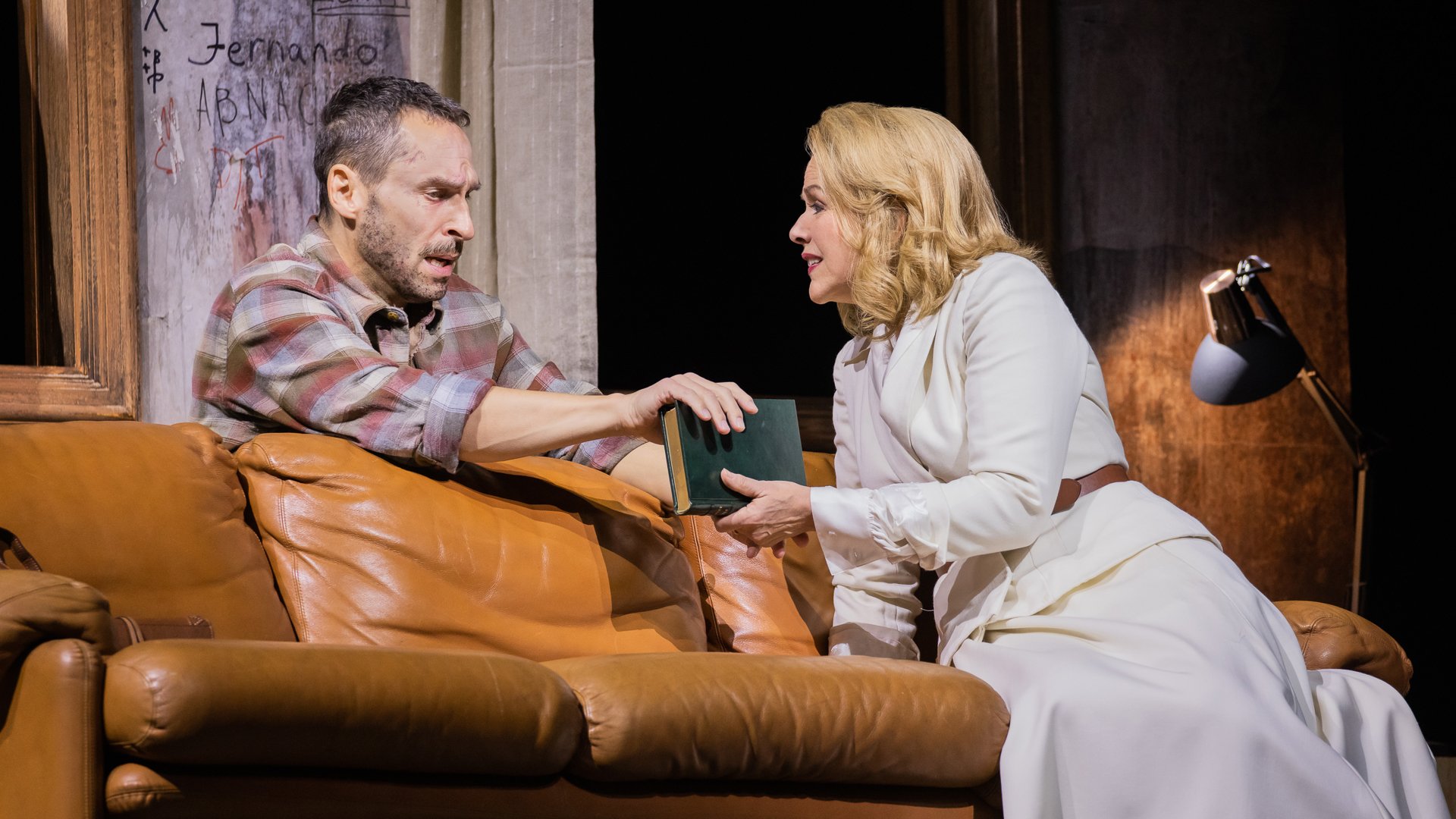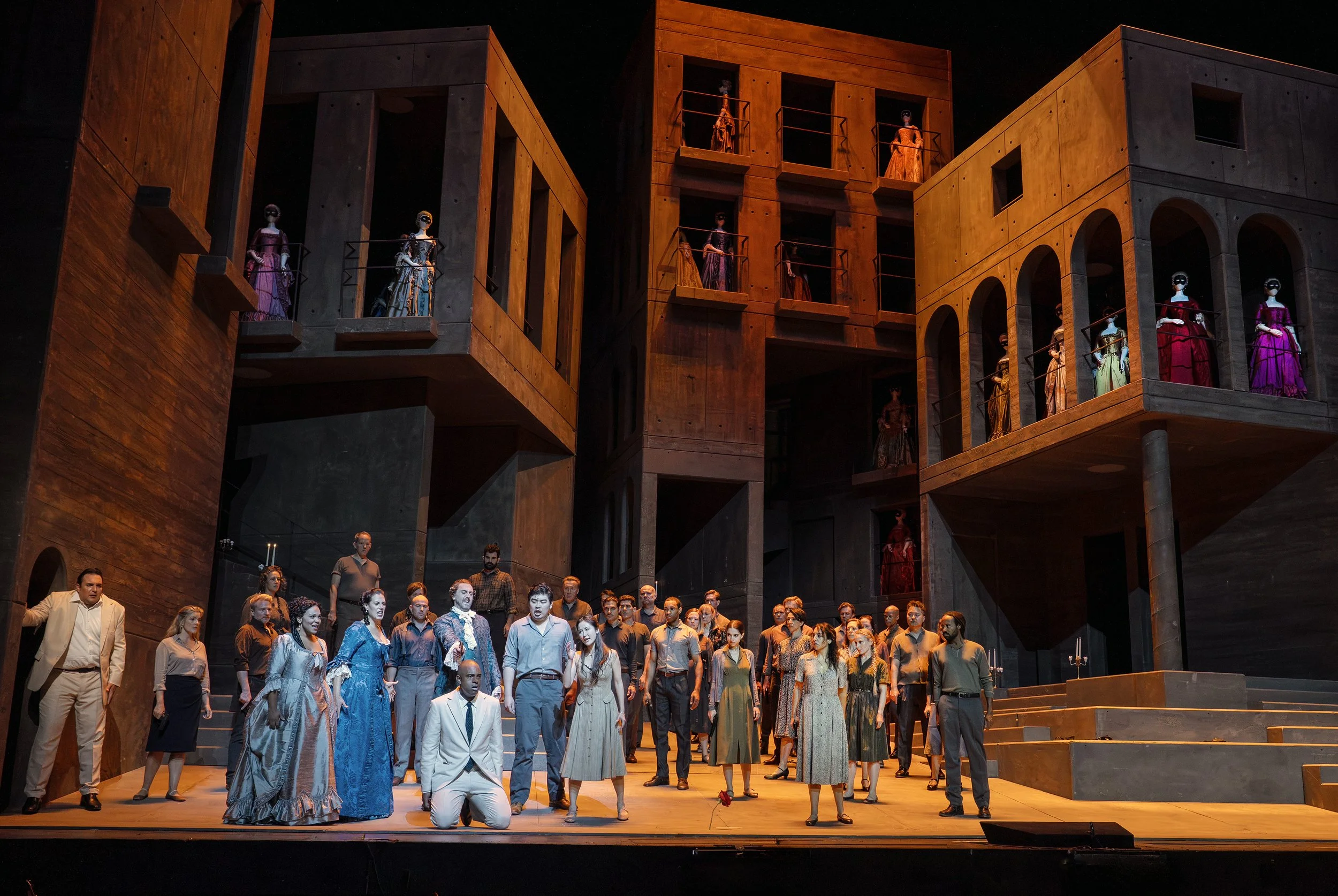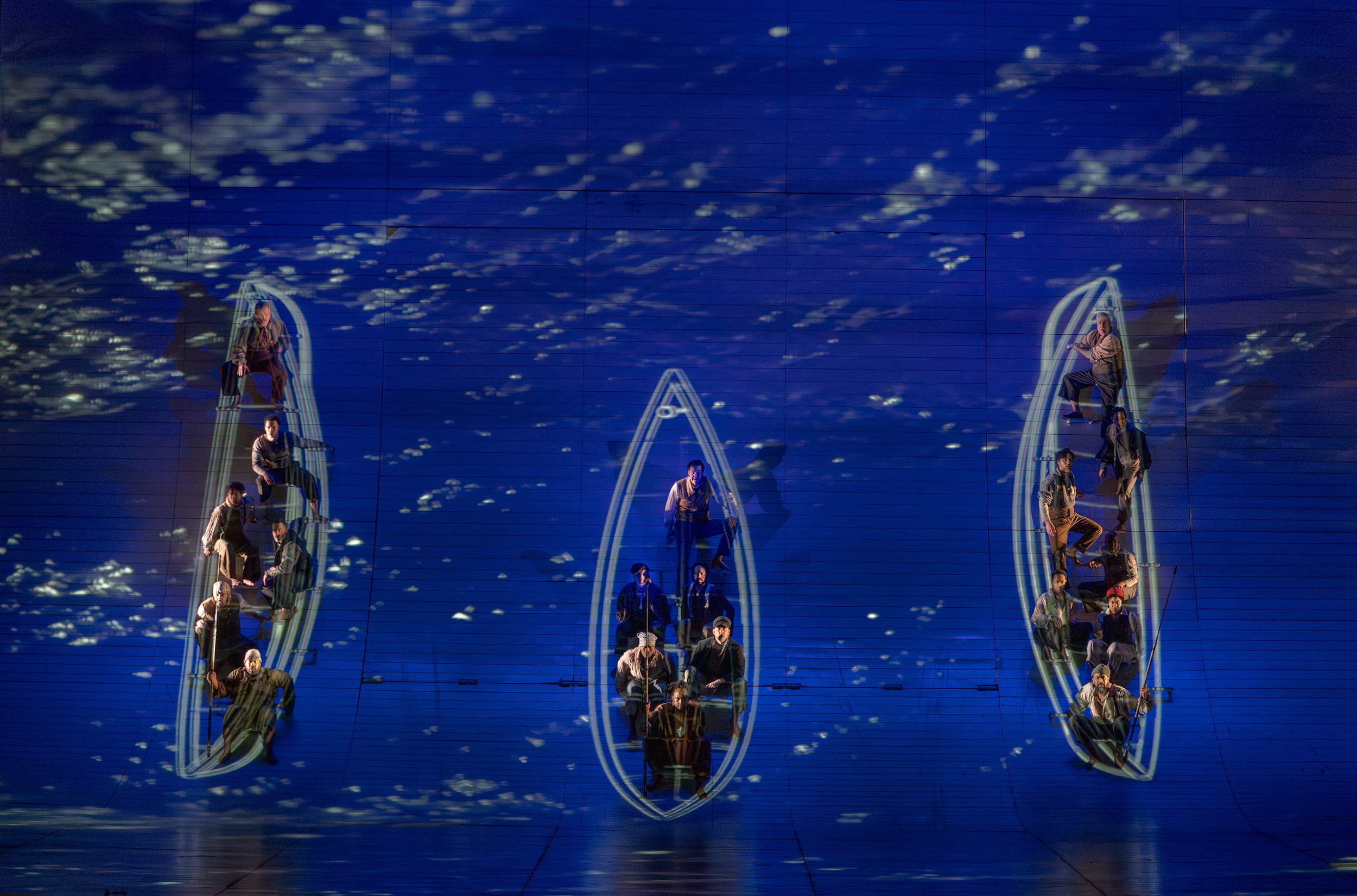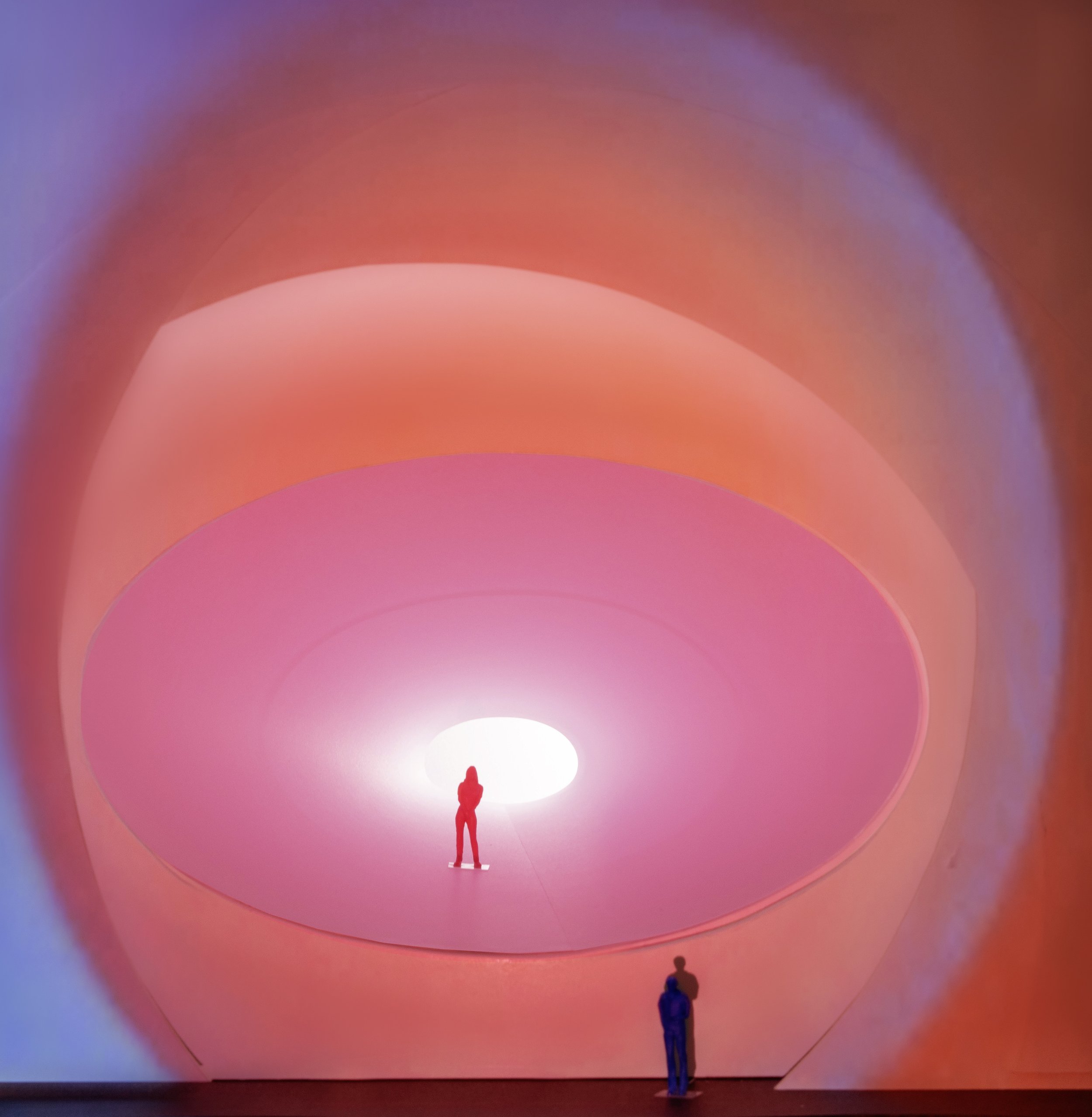My Night at the Opera: The Hours (PART 2)
The empty, surreal set of The Hours during intermission (Violette Leonard)
*SPOILERS AHEAD FOR THE HOURS*
ACT 2
9:40 pm. Dreamy, floaty, yearning music opened Act 2. Kelli O’Hara’s exquisite voice shone like a moonbeam as Laura Brown wondered, “Heaven? Somebody else’s heaven?”
Joyce DiDonato’s Virginia Woolf wandered uneasily on. I spotted her, almost jumped, and grabbed my mother’s arm in excitement. The downstage was divided into three blocks — light blue, pitch black, and light blue again. Joyce knelt on the light blue on the right side of the stage (from my perspective). The setting was a river, but where is she? I wondered. On the riverbank? In the river?
From left: Kelli O’Hara and Joyce DiDonato in The Hours (Sara Krulwich/The New York Times)
During the ethereal duet “The end. Is it here already?” between Laura and Virginia, both suicidal, I noticed rippling blue projections on the wall behind Joyce. I wasn’t sure what was going on, but it looked like Virginia was drowning. I knew that Virginia Woolf didn’t commit suicide until 1941, eighteen years later, but Joyce embodied the troubled writer so persuasively that my stomach tightened in fear. Don’t die, I thought. Don’t die.
Fortunately for both Virginia and me, her husband, Leonard Woolf (tenor Sean Panikkar), interrupted her in time. She was on the riverbank. The lump in my throat dissolved.
When Clarissa runs into Richard’s ex-boyfriend, Louis, there’s a flashback to “that summer in Wellfleet” when they were both in love with Richard (the excellent Kyle Ketelsen). I enjoyed the projections of beach scenes on a sepia curtain, a nice change from the despair, but the scene was long, didn’t sound operatic, and tenor William Burden’s voice didn’t mesh well with Ketelsen and Renée. Okay, done complaining.
In sharp contrast to the Wellfleet scene, the next part gave me chills. Virginia hears angelic singing in ancient Greek, and though she fears that the voices in her head are back, it turns out to be the children of her sister, Vanessa (Sylvia D’Eramo, in a double role). The children (Lena Josephine Marano, Atticus Ware, and Patrick Scott McDermott) sounded eerie and otherworldly together. Virginia’s demons soon bubble up again: “Someone will die at the end of the day… [pointing at one of her nephews] Will it be you, Septimus?” Joyce gave Virginia’s manic episode her all, singing with terrifying intensity and harrowing vulnerability. It was spellbinding.
Kyle Ketelsen and Renée Fleming in The Hours (Evan Zimmerman/Met Opera)
Ketelsen and Renée Fleming had wonderful chemistry and were both at their best in Richard’s heartbreaking suicide scene. I was engrossed but present enough to appreciate how Renée’s voice soared through the house as she tried desperately to reassure him that “I’ll be there!” When Clarissa found Richard’s body outside, the chorus and orchestra were unbearably loud, as forceful as her pain.
Laura returned home. So did Clarissa. Virginia suddenly cried out, “Clarissa will live! The poet must be the one to die.” I literally exhaled, relieved that the ladies had all chosen life. (That was not a political statement.)
With dazzling speed, the chorus performed a costume change on Kelli, changing her wig and popping a necklace and a blue cardigan onto her. With that, Laura passed from 1949 into Clarissa’s 1999. Along with the rest of the audience, I realized that little Richie is Richard and that Laura is Richard’s mother.
From left: Kelli O’Hara, Renée Fleming, and Joyce DiDonato in The Hours (Evan Zimmerman/Met Opera)
Clarissa, Laura, and Virginia, now all in a space where they could see each other, came together for a hauntingly beautiful trio. The poignant lyrics are more relevant than ever. This is the last part:
Here is the world,
And you live in it,
And you are not alone,
And you try to be,
And you try.
It was over. The audience applauded thunderously. Jolted out of my reverie, I joined in the ecstatic standing ovation. I clapped so much that I had to pause to stretch my arm!
STAGE DOOR
11:20 pm. I go to the stage door after almost every show, and I settled in for a longish wait.
11:43 pm. The first of the Three Divas arrived: Renée Fleming! I told her how incredible she’d been and asked for a photo. She graciously agreed, and, afraid to touch her, I let my hand hover an inch away from her back. I thanked her and she disappeared.
11:45 pm. The backstage door opened and out came Joyce and Kelli. I hate it when two singers come out at the same time! Who to talk to?
I chose Joyce. I greeted Kelli, who smiled, said hi, and left. Now, what to say?
Me with Joyce! (Violette Leonard)
“You were the best,” I told Joyce, breathlessly and sincerely. “Really, you were… the best. You were so convincing — I completely believed you.” Joyce looked moved. “Thank you, that means a lot to me.”
Amazingly, she remembered me from 2019 — unprompted! I didn’t hesitate to put my arm around her shoulders for the photo; I felt at ease with her.
There wasn’t much more to stay for. I congratulated the kids and headed out, awestruck.
IN CONCLUSION
So what did I take away from my first modern opera?
First, give contemporary classical music a chance. The Met will put a new focus on contemporary works going forward, so I’ll try to keep opening my mind.
Second, the critics aren’t the audience. It “lacks an original voice,” griped The New Yorker. Observer called it “a frustratingly broad, often tiresome opera.” Parterre Box attacked it as “dishonest”, “egregiously sentimental”, and “bloated.” For all the critics’ kvetching, the last three performances sold out — despite a cyberattack on the Met that halted ticket sales for nine days—, Kevin Puts got a standing ovation, and the Live in HD transmission took 8th place in cinemas that weekend with one showtime on one day.
Third, beautiful music is still being written — reviews frequently described the music as “pretty” or “beautiful” —, and some composers haven’t lost sight of the greats. Case in point: the ending, which evokes the final trio from Richard Strauss’s Der Rosenkavalier while retaining its uniqueness.
In another good omen for its endurance at the Met, The Hours returns next season, with the Three Divas. Wild horses couldn’t keep me away!
While I remain primarily devoted to the classics, I’ll continue to be curious about new music and try to expand my horizons beyond my comfort zone. I hope you will too.
Happy 2023!








